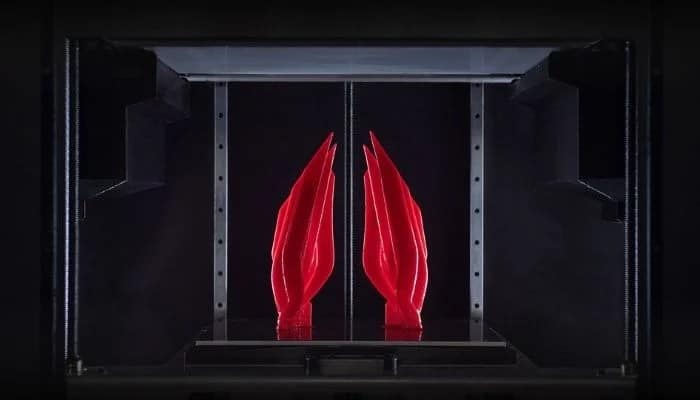BCN3D, which has been on the FDM printer market for ten years, has achieved a tipping point today with the introduction of a new technology. The Barcelona-based firm will release its “Viscous Lithography Manufacturing” (VLM) technology after three years of research and development.
It is, as the name says, a stereolithographic printing process for viscous resins. Although there are many parallels between the mSLA and DLP processes, BCN3D’s VLM technology is completely different from them.
Viscous Lithography Manufacturing Technology
On March 2nd, BCN3D held a press conference to unveil the new technology. There, we learnt that BCN3D is able to temporarily fix (in suspension) the material under the film (in the shape of a roll) that transports it from the resin cartridge to the printed item by using a viscous resin. A UV-A light source covered by a monochrome LCD screen cures the resin. After the layer is formed, the film transports the non-polymerized resin to a filtration system for reuse.
VLM printers do not have a resin vat since the VLM technology employs separate resin cartridges and a moving film. As a result, pieces are generated immediately on a printing plate rather than soaking in resin. Furthermore, it allows for the simultaneous printing of several materials, which was previously unachievable with other resin technologies, bringing up a slew of new possibilities. BCN3D prevents material contamination by employing a roller. However, when printing multi-materials, some of the resin must be reused to avoid contamination, resulting in somewhat higher waste.
Why VLM?
This method enables printing of materials that are up to 50% more viscous than conventional procedures. BCN3D has collaborated with Arkema to provide a line of high-performance resins. Please keep in mind that you can vary the mechanical qualities of your components by adding additives in larger concentrations. BCN3D assures products that are up to three times more resistant to impact and have a 200 percent improvement in tensile strength by employing these viscous polymers. According to BCN3D, during post-processing, the high viscosity permits the fabrication of biomaterials and highly isotopic components. These post-processing methods are identical to those used in today’s resin printing processes.
Although BCN3D does not yet sell these devices, they have established an adoption program that allows qualifying organizations to test this innovative technology. This new method should be available on the market within a few years, with equipment costing less than €50,000, according to BCN3D. This latest statement appears to be a watershed moment for the Spanish company. Though it had previously been open-source, it is now patenting this new technology. However, we were told during the press conference that BCN3D will maintain the machines and FDM procedures open-source.
Video Link for more information
Subscribe to AM Chronicle Newsletter to stay connected: https://bit.ly/3fBZ1mP
Follow us on LinkedIn: https://bit.ly/3IjhrFq
Visit for more interesting content on additive manufacturing: https://amchronicle.com/



